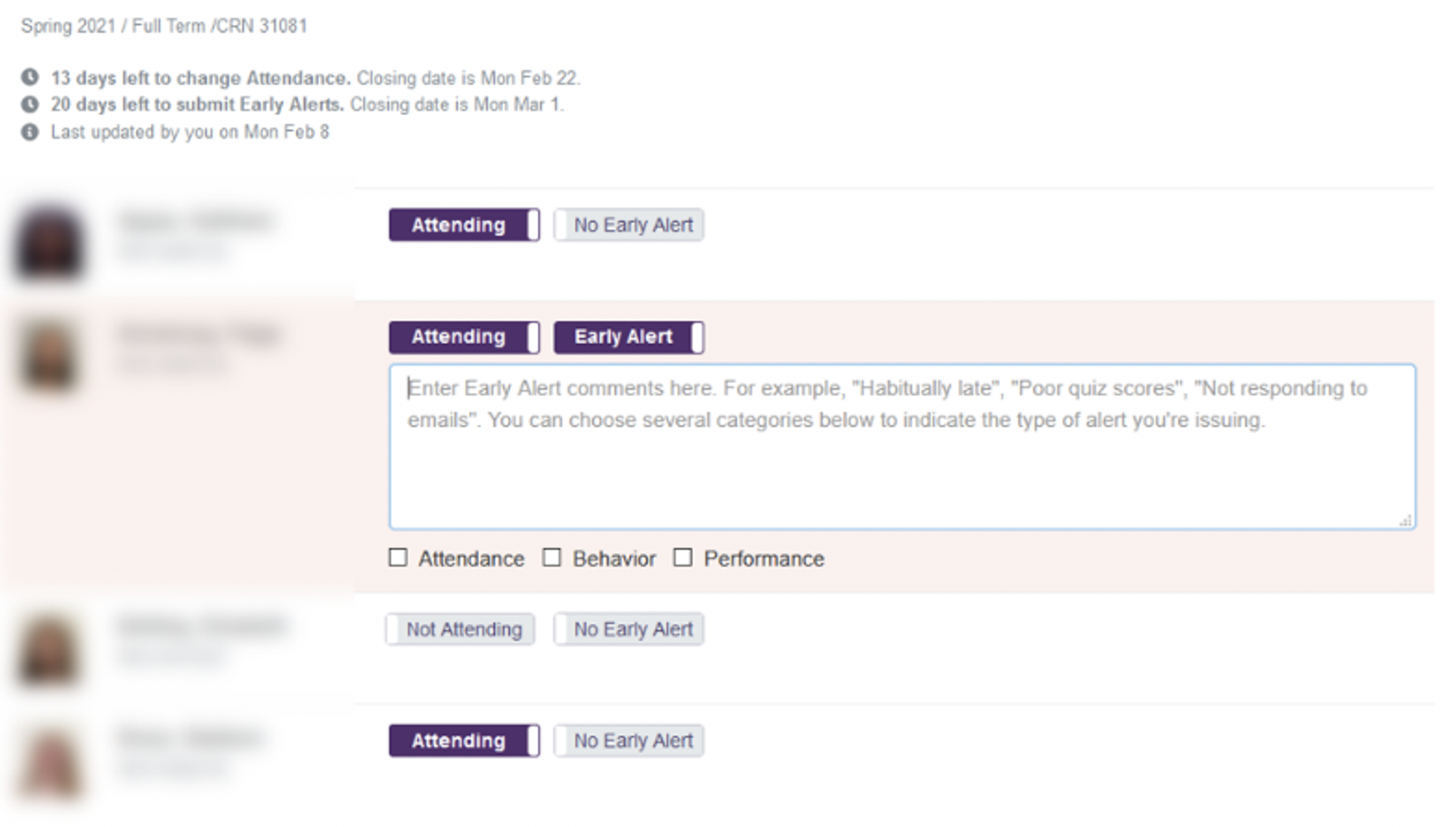 The Office of Student Retention and Completion, in collaboration with the Offices of the Registrar, Information Technology, and the Deans, recently launched a pilot “Student Attendance and Early Alert Application” for the Spring 2021 semester. The pilot program is designed for the early detection of students exhibiting signs of academic distress. Research on student retention supports early identification/intervention programs as high impact activities that positively affect student success. To this end, the custom app, designed by Will Geiger, IT, serves to facilitate communication between faculty, staff, and academic advisors.
The Office of Student Retention and Completion, in collaboration with the Offices of the Registrar, Information Technology, and the Deans, recently launched a pilot “Student Attendance and Early Alert Application” for the Spring 2021 semester. The pilot program is designed for the early detection of students exhibiting signs of academic distress. Research on student retention supports early identification/intervention programs as high impact activities that positively affect student success. To this end, the custom app, designed by Will Geiger, IT, serves to facilitate communication between faculty, staff, and academic advisors.
The pilot comprises representation from all colleges and a cross-section of academic departments. Thirty-five faculty participants from the departments of Accounting, English and Theatre, Health Administration and Human Resources, and Physics and Engineering, agreed to participate in their roles as course instructors. A total of 1,113 students, including graduate and undergraduate, are included in pilot outreach activities. Since early alerts are directed to students’ academic advisors, there are many College of Arts and Sciences faculty advisors in addition to PCPS and KSOM professional academic advisors who are participating in the pilot.
The “Student Attendance and Early Alert Application” is intended to have the following student outcomes:
- Increase student class attendance and participation.
- Improve student engagement with professors and academic advisors.
- Prompt students to share responsibility for their academic success by maximizing use of campus resources.
Dr. Teresa Grettano, Director of the First Year Writing Program, was one of the first faculty members to sign on to the pilot program: “Writing instructors usually encounter students in the vulnerability of their first year, and because of our pedagogical practices and assignment types, students are more likely to express or demonstrate struggles. Students need support and instruction in their transition from high school to college, but many are afraid to ask for it or don’t know that it even exists. The program lets students know there are people across campus interested in their well-being – academic, emotional, financial, spiritual, and otherwise. It is cura personalis in action.”
Dr. Dan West, Chairman and Professor in the Department of Health Administration and Human Resources, is enthusiastic about this new system as it will not only help his students, but also assist with program accreditation efforts. “The accrediting and credentialing organizations in Health Administration and Human Resources stress the importance of academic advising in overall retention efforts by undergraduate and graduate programs. Early detection of student concerns is vitally important for faculty advisors in helping students successfully navigate their academic studies and achieve positive outcomes,” states West. “Our participation in this pilot helps us to meet our criteria for accreditation and gives us information to demonstrate how we help our students.”
Finally, Dr. Harry Dammer, Associate Dean, College of Arts and Sciences, is also an integral partner in the endeavor. Of the initiative, he writes “The CAS Dean’s office is grateful for the faculty who have volunteered for this new initiative and also excited about the work Nick Truncale and Julie Ferguson (Registrar) are doing to improve retention. This issue is of utmost importance in our current financial and enrollment situation.”
If you have any questions about the system, please reach out to Nicholas Truncale, Director of Student Retention and Completion nicholas.truncale@scranton.edu.


 Microsoft Teams is a workspace for real-time collaboration and communication, meetings, file and app sharing, and more.
Microsoft Teams is a workspace for real-time collaboration and communication, meetings, file and app sharing, and more.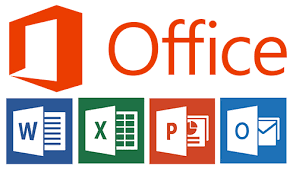 Microsoft 365 Training is a free, interactive, hands-on training platform that helps people develop technical skills related to widely used Microsoft products and services including Outlook, OneDrive, Word, Excel, PowerPoint, and SharePoint.
Microsoft 365 Training is a free, interactive, hands-on training platform that helps people develop technical skills related to widely used Microsoft products and services including Outlook, OneDrive, Word, Excel, PowerPoint, and SharePoint.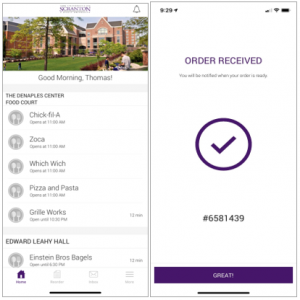 During the Fall 2020 semester, the University IT staff partnered with Aramark to implement Transact’s Mobile Ordering application here at the University of Scranton.
During the Fall 2020 semester, the University IT staff partnered with Aramark to implement Transact’s Mobile Ordering application here at the University of Scranton.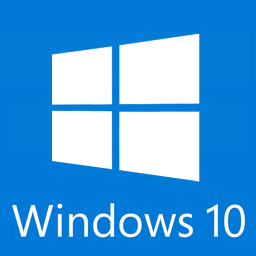 A Microsoft employee once (in)famously said that Windows 10 would be the last version of Windows. That doesn’t mean there won’t be a Windows 11 or 12, it just means that upgrading won’t be as much of an ordeal as the hop from Windows 7 to Windows 10 (or previous hops from Windows XP to Windows 7; Windows 95 to Windows XP). Well maybe, but not yet.
A Microsoft employee once (in)famously said that Windows 10 would be the last version of Windows. That doesn’t mean there won’t be a Windows 11 or 12, it just means that upgrading won’t be as much of an ordeal as the hop from Windows 7 to Windows 10 (or previous hops from Windows XP to Windows 7; Windows 95 to Windows XP). Well maybe, but not yet.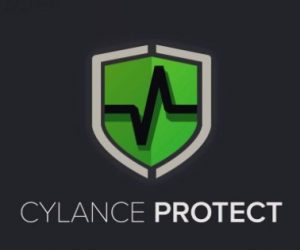 The University of Scranton’s Division of IT is currently deploying Cylance Endpoint Detection and Response (EDR) to all University laptops and desktops. As of this writing, Cylance EDR has been deployed to 417 Windows and 23 Mac endpoints. Over 21 million files have been scanned and 61 files have been quarantined as threats. In addition, over 500 alerts have been generated regarding suspect endpoint behavior, with the majority being low severity.
The University of Scranton’s Division of IT is currently deploying Cylance Endpoint Detection and Response (EDR) to all University laptops and desktops. As of this writing, Cylance EDR has been deployed to 417 Windows and 23 Mac endpoints. Over 21 million files have been scanned and 61 files have been quarantined as threats. In addition, over 500 alerts have been generated regarding suspect endpoint behavior, with the majority being low severity.